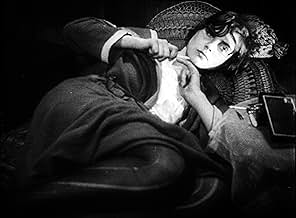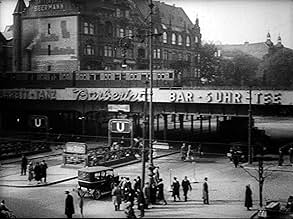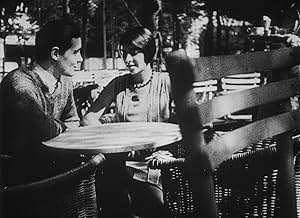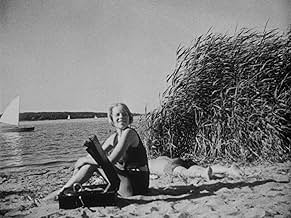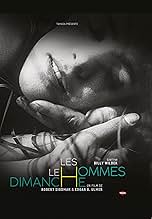AVALIAÇÃO DA IMDb
7,3/10
3,8 mil
SUA AVALIAÇÃO
Adicionar um enredo no seu idiomaTwo men and two women enjoy a pleasant Sunday at the beach amid the unending toil of the working week.Two men and two women enjoy a pleasant Sunday at the beach amid the unending toil of the working week.Two men and two women enjoy a pleasant Sunday at the beach amid the unending toil of the working week.
Kurt Gerron
- Self
- (não creditado)
Valeska Gert
- Self
- (não creditado)
Heinrich Gretler
- Self
- (não creditado)
Moriz Seeler
- Photo Subject at Beach
- (não creditado)
Ernö Verebes
- Self
- (não creditado)
Avaliações em destaque
10tilmazio
Some of the people commenting on this movies mention the fact that it was made only three years before Hitler came to power. While this is true, it is a historical misunderstanding to think that in 1929, when the film was conceived and shot, Hitler was inevitably looming at the political horizon in Germany. In fact, in the Weimar republic of the late 20s there was good reason to believe, that the worst was over for Germany after the chaotic post-WWI-period. The economy had somewhat stabilized, the political circumstances were still chaotic, but I guess people had grown accustomed to the fact that the government changed every so often. Germany was not a democracy in the truest sense of the word, but there was a thriving lower-middle class, and that is what the people in the film are meant to represent. There was good reason to believe, that these people would be typical of Germany at this time. To think that the film makers were delusional about the true state of the German state is a judgement that comes out of knowing what happened later.
Thats what makes this film even more special in my thinking. It shows that there could have been potentially another Germany, and that fascism was not the inevitable consequence of the social condition in the early 30s, German national character or what so ever. In fact, I think thats why this master piece is not as well-known as it deserves to be. It does not fit the bill of 1920s Mabuse-style Germany, where Caligari was an early warning of the Nosferatu was the blue-print of a coming dictator etc, all this Kracauer stuff.
Having said that, I would like to point out two additional things about this film, that make it unique. First of all, with its on-location shot, its amateur actors and its next-to-nothing ,yet social realist story, it is a rare fore-runner of the post-war cinema of Italy etc, that has not acknowledged. (Then again, Rosselini et al never saw this film, but then again, where is the "neo" in "neo-realism" coming from.) It also seems to me that this might very likely be the first "indie" movie. "Indie" is of course a very vague term, and what is called "Independent cinema" differs greatly depending on where the critic is coming from. But I personally know of no other movie, that actually made it into the movie houses, that was produced by a handful of non-pros without the support of a studio. Of course, there are the surrealist films etc, but this was a reasonably successful film, not some art experiment. This is a very daring thesis, I know, but so far nobody was able to prove me wrong....
Thats what makes this film even more special in my thinking. It shows that there could have been potentially another Germany, and that fascism was not the inevitable consequence of the social condition in the early 30s, German national character or what so ever. In fact, I think thats why this master piece is not as well-known as it deserves to be. It does not fit the bill of 1920s Mabuse-style Germany, where Caligari was an early warning of the Nosferatu was the blue-print of a coming dictator etc, all this Kracauer stuff.
Having said that, I would like to point out two additional things about this film, that make it unique. First of all, with its on-location shot, its amateur actors and its next-to-nothing ,yet social realist story, it is a rare fore-runner of the post-war cinema of Italy etc, that has not acknowledged. (Then again, Rosselini et al never saw this film, but then again, where is the "neo" in "neo-realism" coming from.) It also seems to me that this might very likely be the first "indie" movie. "Indie" is of course a very vague term, and what is called "Independent cinema" differs greatly depending on where the critic is coming from. But I personally know of no other movie, that actually made it into the movie houses, that was produced by a handful of non-pros without the support of a studio. Of course, there are the surrealist films etc, but this was a reasonably successful film, not some art experiment. This is a very daring thesis, I know, but so far nobody was able to prove me wrong....
Marvellous late German silent that anticipates the Italian neo-realists, although I note some claim that this is not realistic at all and may even be showing struggling Berlin through rose tinted glasses. I'm not sure; those fantastic city sequences seem real enough and perhaps the regularly intoned opinion that Hitler was lurking in the shadows of a dispirited people, is itself a little fanciful. In any event this is a great little film filled with fantastic shots, moving street shots of and from moving trams, poetic close-ups of the young folk and a great sense of landscape at the lakeside. As usual with me and silent movies, I seem to get captions I don't need because the action is so obvious and whole sequences of back and forth dialogue left untitled. But just to watch the imagery is good enough and the little trysts, arguments, upsets and loving looks need no titles at all.
If you enjoy classic silent cinema then you won't want to miss this treat. At times scenes are reminiscent of King Vidor's The Crowd, made just the year before (most especially in those moments set indoors, during which one of the couples gently bicker or the scene during which the principals first meet up for their group date); while at others the open air, carefree mood is suggestive of Renoir's masterpiece Partie de Campagne, made a decade later. But People on Sunday is a distinct work in its own right, an evocative film made by some stellar talent: the Siodmak brothers, Edgar Ulmer, Billy Wilder and Fred Zimmerman - all of whom would go on to varying degrees of success in the States after fleeing the Nazis. Their film is thus both a record of a time lost, a beautifully shot piece showing a Berlin that was soon to vanish for ever, as well as demonstrating the collaborative talents of some major figures in their early years. There is no hint of the dark years to come seen here, or the debilitating effects of run away inflation which marked the end of the Weimar Republic and led to the inexorable rise of extreme politics. People on Sunday is above such explicit social comment, unless it is political by the mere fact of focusing on ordinary people. It simply tells the tale of a group (played by non professional actors we are informed, but it hard to tell such is the quality of the performances) enjoying themselves while out on one sunny weekend day, picnicking, boating, kissing, promising more to each other and so on, interspersed with more general shots of the German people similarly at play. The skill and pleasure for the viewer today is in the way this is done, completely without ostentation, shot marvelously, everything still feeling fresh, spontaneous and genuine , and with a real feeling for place. Ironically, for this viewer at least, so much of the film seems so natural and fluid that one is more aware that is an illusion; such unforced art as this takes a great deal of time, patience and skill on the part of the participants and creators.
If you want to see more of German cinema from this period, other than more familiar classics, then this is a real treat, being both less known and marvelously restored. The BFI DVD version has been created from several sources and is the longest version available. It also features a splendid Weill-like score, which fits the milieu like a glove and which begs issuing separately as it stands up well as a listen on its own.
If you want to see more of German cinema from this period, other than more familiar classics, then this is a real treat, being both less known and marvelously restored. The BFI DVD version has been created from several sources and is the longest version available. It also features a splendid Weill-like score, which fits the milieu like a glove and which begs issuing separately as it stands up well as a listen on its own.
Extraordinary and very simple silent film, put together by some of the most remarkable talents of Twentieth Century Cinema - just read those credits! Within a few years most of these people were in Hollywood, and Hitler had destroyed both the wonderful film industry they had helped build and the joyous Berlin that this film depicts.
The film tells the story of four strangers, two men and two women, enjoying a lazy Sunday by a lake in Berlin. Nothing much seems to happen, but there is a lot going on, as the four interact. There is innocence, the potential for love, the danger of sex, the force of jealousy and the pain of longing. And through it all is the joy of living!
Magnificently shot - largely in extreme close-up - the film allows us a glimpse of Berlin between the wars and it is sad to watch it with the knowledge of what was soon to be. It would have been impossible to make this film with dialogue - the words would have destroyed the nuance and the emotion. It reveals the power of silent cinema.
If the print you see is without a soundtrack, as mine was, then may I recommend playing the Essential Marlene Dietrich during the film. I did this and the combination was unforgettable.
The film tells the story of four strangers, two men and two women, enjoying a lazy Sunday by a lake in Berlin. Nothing much seems to happen, but there is a lot going on, as the four interact. There is innocence, the potential for love, the danger of sex, the force of jealousy and the pain of longing. And through it all is the joy of living!
Magnificently shot - largely in extreme close-up - the film allows us a glimpse of Berlin between the wars and it is sad to watch it with the knowledge of what was soon to be. It would have been impossible to make this film with dialogue - the words would have destroyed the nuance and the emotion. It reveals the power of silent cinema.
If the print you see is without a soundtrack, as mine was, then may I recommend playing the Essential Marlene Dietrich during the film. I did this and the combination was unforgettable.
On a Sunday, four young befriended people make an excursion to the lake Wannsee in Berlin to spend their free time in the sun with boat trips, bathing and flirting.
This low budget production demands to remain at the surface of everyday life and to show certain scenes, coincidences and trivialities of it. It is mostly interested in the details and shows the other side of the hectic, restless Berlin - the peace of a summerly Sunday. Here, the people are removed from the daily rush, and it is discernible how the makers agree with their protagonists. They celebrate the self-confidence of the young generation - which is not yet overshadowed by the big crisis at the beginning of the 1930s - and demonstrate the physical joy of life, the carefreeness and playfulness. The other side of this urban way of life is, which apparently only banks on superficialness and the momentary, promiscuity and the wounds coming from this, the harshness and the cold of changing feelings. It's cynically depicted in one long tracking shot over tree-tops (indicating symbolically sexual intercourse) that ends at a pile of thoughtlessly ditched trash.
This low budget production demands to remain at the surface of everyday life and to show certain scenes, coincidences and trivialities of it. It is mostly interested in the details and shows the other side of the hectic, restless Berlin - the peace of a summerly Sunday. Here, the people are removed from the daily rush, and it is discernible how the makers agree with their protagonists. They celebrate the self-confidence of the young generation - which is not yet overshadowed by the big crisis at the beginning of the 1930s - and demonstrate the physical joy of life, the carefreeness and playfulness. The other side of this urban way of life is, which apparently only banks on superficialness and the momentary, promiscuity and the wounds coming from this, the harshness and the cold of changing feelings. It's cynically depicted in one long tracking shot over tree-tops (indicating symbolically sexual intercourse) that ends at a pile of thoughtlessly ditched trash.
Você sabia?
- CuriosidadesThe film was a major hit when it was released in Germany in 1930. Five of the people who worked on the film went on to direct films in Hollywood: Curt Siodmak, his brother Robert Siodmak, Edgar G. Ulmer, Fred Zinnemann and Billy Wilder.
- Erros de gravaçãoWhen the movie star picture cards are torn off the wall, the number of cards still on the wall constantly changes. Sometimes more cards are still on the wall than in the shot before etc.
- ConexõesFeatured in Histoire(s) du cinéma: Toutes les histoires (1988)
Principais escolhas
Faça login para avaliar e ver a lista de recomendações personalizadas
- How long is People on Sunday?Fornecido pela Alexa
Detalhes
- Tempo de duração1 hora 13 minutos
- Cor
- Mixagem de som
- Proporção
- 1.20 : 1
Contribua para esta página
Sugerir uma alteração ou adicionar conteúdo ausente

Principal brecha
By what name was Gente no Domingo (1930) officially released in India in English?
Responda

